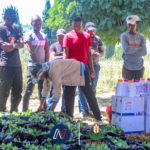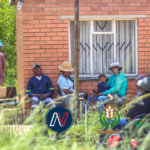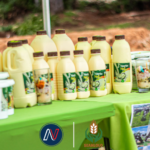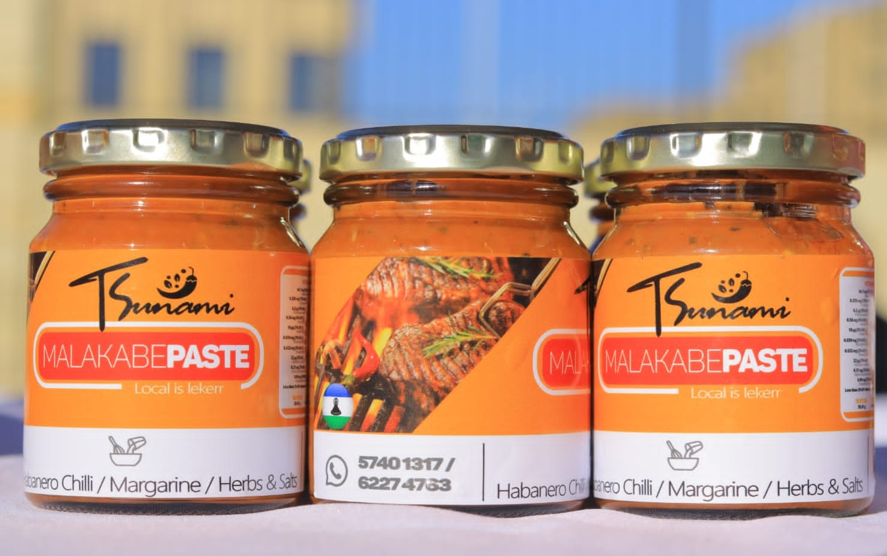Khotso Morakabi, known affectionately as Tsuna, has transformed garden ingredients into culinary delights that are currently seasoning kitchens across the village of Ha-Foso, in Berea.
His journey began in 2019 with turning a bare land into an urban garden using recycled containers, empty bottles, and whatever scraps of soil he could find. He built a flourishing garden of chillies, tomatoes, onions and herbs.
From these modest beginnings, Tsuna’s urban garden has evolved into a small-scale sauce production enterprise.
The seed of Tsuna’s culinary adventure, he recounts, was planted during the COVID-19 lockdown.

“Jobs were on hold, movements restricted, and I found myself stuck in a rented house. The only things I saw were limited soil, unused bowls, and empty bottles. That’s when my idea began taking shape,” he says, recounting his first plantation of chillies, and to his surprise, the harvest exceeded all expectations.
Faced with a bountiful yield, he turned to canning and preserving his produce.
“While I was canning, an idea came: why not make a sauce?” he says.
At first, Tsuna had no formal skills in canning or sauce-making, but, desperate to stay busy during the pandemic, as an unskilled man, his aim was just to make a few coins during difficult times.
He began selling chilli sauces on Facebook, but delivery was challenging due to lockdown restrictions; however, he found ways to reach his customers.
“Early sales were promising, yet some customers complained that bottles burst before opening.”
Rather than being discouraged, Tsuna used the feedback as a learning opportunity.
“I sat down and researched proper canning and bottling techniques online,” he explains, saying he watched tutorials, studied the work of chefs and culinary experts, and gradually improved his skills.
With persistence and practice, the quality of his sauces improved, and customer satisfaction grew. The chilli sauce became his first signature product, putting him on the map in his community and attracting a growing customer base.
Recognising that not everyone enjoys spicy flavours, Tsuna expanded his repertoire.
He developed a mild, tomato-based sauce called “majapere,” which quickly became a breakfast staple in homes across the village.
“Each bottle tells a story beyond flavour.”
He said to sustain and meet the needs of his customers, he looked into partnerships.
“I did not have enough tomatoes, so I partnered with other local farmers who produced in large quantities and with their tomatoes and my herbs, I was able to create the best sauce, and it quickly gained popularity.”
This collaboration highlights Tsuna’s inclusive approach, ensuring that his products meet diverse tastes and support local producers.
Tsuna’s love for cooking naturally drove him to expand his garden.
“When I cook with ingredients I have grown, every dish tastes extraordinary. I am not just cooking; I am exploring and testing new things all the time,” he shares.
He describes his kitchen as an extension of his garden, a laboratory where flavours are discovered and perfected.
Beyond chilli and tomato blends, he ventured into onion sauces. Initially unsure whether customers would enjoy them, he shared samples with neighbours, who responded positively.
Encouraged, he produced more for sale.
“Each recipe is rooted in the belief that sauces do more than spice food, they unite people and honour tradition,” he notes.
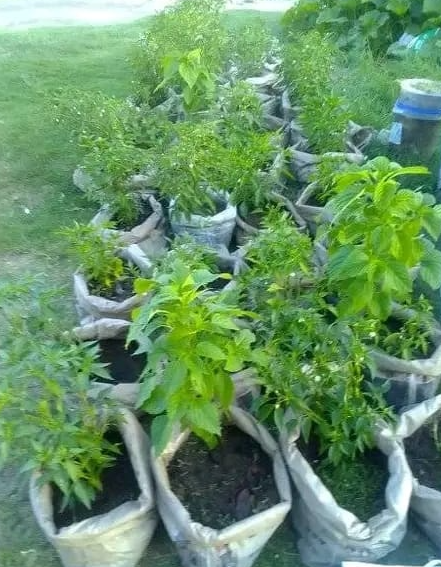
Over the seasons, Tsuna transformed what others might have seen as wasted or limited space into a source of abundance. His small urban plot became a testament to resilience and ingenuity.
“I use everything in front of my eyes to make a living,” he says.
In between his main crops, he grows basil, rosemary, thyme, and mint, each adding new dimensions to his sauces.
“Basil is my go-to for fresh, new notes. Rosemary adds a woody depth, reminding me of home-cooked meals from my childhood. Mint is my surprise ingredient, making dishes brighter and more exciting,” he explains.
Every step, from seedling to bottling, is undertaken with care and a commitment to quality.
“There is nothing more beautiful than seeing my small garden produce abundantly and ending up in the kitchen making sauces for Basotho,” he says, yet the path has not been without challenges.
Pricing his sauces was initially difficult. As an unskilled producer relying on natural ingredients and recycled containers, he worried customers would not pay. He had to balance profit with affordability, mindful of his community’s financial constraints, especially during the pandemic.
“The fact that I only used natural ingredients in a recycled, man-made garden was a challenge,” Tsuna admits. Still, this very authentic, organic, locally sourced, and carefully prepared product helped attract customers who appreciated the effort and care behind each product.
The pandemic added another layer of difficulty, as many people struggled to put food on the table, requiring Tsuna to be flexible and considerate with pricing and production.
Over the past six years, Tsuna has grown as both a gardener and a businessperson. He has diversified his marketing, using social media platforms to reach more customers. Word-of-mouth referrals have expanded his clientele, and he has learned to adjust prices as his experience and costs have evolved.
Yet some challenges remain. He lacks access to proper storage and kitchen equipment, limiting his production capacity.
Maintaining sanitation and hygiene standards has been another hurdle, though he continues to find innovative solutions.
Despite these obstacles, Tsuna has carved out a unique space in the local food industry. His commitment to organic products and natural ingredients resonates with customers.
“Whether it’s my flavourful onion sauce or my chilli blends, I know I am offering products that are not only delicious but also healthy and environmentally conscious,” he says.
From 2019 to 2025, Tsuna has learned invaluable lessons in adaptability, determination, and the importance of quality.
“Flexibility allowed me to survive strict lockdowns, while perseverance and creativity have set me apart from my competitors. I hope with the work I have already put in, I will receive financial support or sponsorship to expand both my garden and sauce production, but even without it, I believe I have demonstrated that passion and dedication can transform humble beginnings into lasting impact,” he says.
Tsuna’s journey is a lesson in resourcefulness and imagination. He encourages others to see potential in unlikely places, such as a balcony, a single pot, or a small patch of soil.
“Use what you have, and it will lead to more to achieve,” he advises.
He hopes to teach others to “find the garden in what they already have,” inspiring everyone from schoolchildren to elders to start small and dream big.
For soil fertility, Tsuna enriches his garden with natural fertilisers such as crushed eggshells, banana peels, and nutrient-rich rabbit manure, collected from local sources.
“Using what nature gives keeps my small farm healthy and my conscience clear,” he says, stressing that the organic cycle he has created nourishes his crops and respects the environment, reflecting his broader philosophy of sustainability and care.




